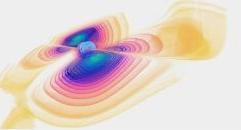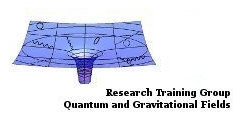 Workshop Programming of
Workshop Programming of Heterogeneous Systems in Physics
Jena, 5-7 October 2011
Topic of the Workshop
In recent years, programming high performance computing systems has
shifted from single layer programming models to multiple layers of
massively parallel systems. Widely used message-passing or thread
programming models do not longer map efficiently to upcoming
heterogeneous systems. Further, different brands of graphics cards
(GPU) and other accelerators, as well as large numbers of processor
(CPU) cores, each with increasing vector computing capability require
dedicated computational kernels. With the introduction of programming
language extensions like Cuda (GPU) or TBB (threading) and more
general frameworks like OpenCL, this power has been made accessible to
general applications. However, topics like code optimization and
portable code development remain challenging.
Today many computer system are heterogeneous, meaning that they
consists of several layers of parallelism. This is especially true for
parallel cluster computer using GPUs, Cell processor or FPGA
accelerators and fat shared memory nodes. Programming such system is
different from programming a single core CPU. While it is relatively
easy to get a running code, it is much harder getting a optimized fast
code.
This workshop focuses on the programming of heterogeneous
system, especially GPUs.
On the first day is dedicated to an introduction
to the programming of GPUs. A tutorial including a hands-on session will
give the opportunity for less experienced participants to learn about
GPU computing.
The next two days of the workshop will discuss how
physics applications, especially in relativity and quantum field
theory, may benefit from the use of GPUs. The topics covered by this
workshops are:
- An introduction to the programming of GPUs with OpenCL/Cuda.
- Solving partial differential equations efficiently on the heterogeneous computing systems. There is some emphasis on GPU computing, but other accelerators and the efficient use of large multi-core cluster nodes are considered as well.
- Optimization of computational kernels coming from finite differences, spectral methods and lattice gauge theory on accelerators.
Organizers
The workshop is organized by
G. Zumbusch (Chair, University Jena)
B. Brügmann (University Jena)
L. Rezzolla (AEI Potsdam)
A. Weyhausen (University Jena)
B. Zink (University Tübingen)
Contact
For further details, please write to:
GPUWorkshop2011 AT uni-jena.de


